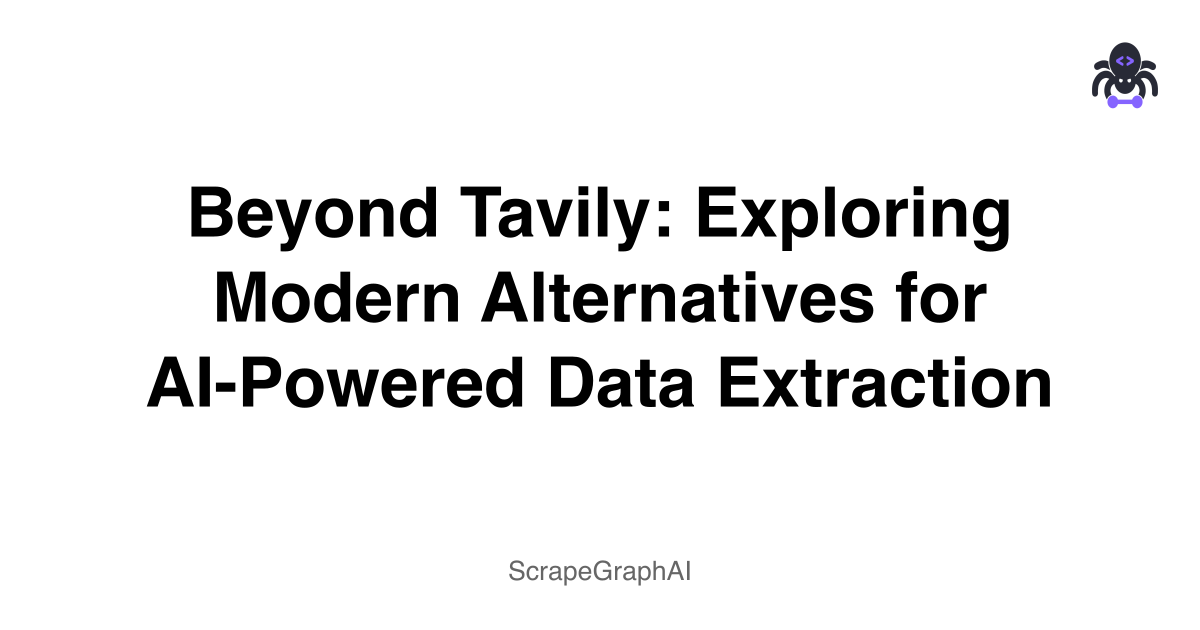As the creator of ScrapeGraphAI, I've spent countless hours thinking about how AI agents and applications gather information from the web. Tavily has certainly made waves as a search API designed specifically for LLMs and AI agents, but the landscape of data extraction tools is rich with alternatives, each with unique strengths for different use cases. Today, I want to explore several alternatives to Tavily, with a particular focus on how different approaches to web data extraction can serve various needs. Understanding the Use Case First, let's clarify what we're solving for. Tavily excels at providing search results formatted for AI consumption - it's essentially a search engine API optimized for LLM ingestion. But many developers need more than search results; they need structured data extraction from specific websites, dynamic content handling, and deep scraping capabilities. The Alternatives Landscape
- ScrapeGraphAI (Yes, I'm Biased, But Hear Me Out) ScrapeGraphAI takes a fundamentally different approach. Instead of providing search results, it uses LLMs to intelligently scrape and extract structured data from any website. Here's what makes it powerful:
Natural Language Scraping: Define what you want to extract using plain English prompts, not complex selectors Adaptive Intelligence: The LLM understands page structure dynamically, making it resilient to website changes Multiple LLM Support: Works with OpenAI, Gemini, Groq, Azure, and even local models like Ollama Graph-Based Architecture: Uses a pipeline approach that's both powerful and customizable
Best for: Extracting structured data from specific websites, building scraping pipelines, handling dynamic content, and cases where you need data in exact formats.
from scrapegraph_py import Client
# Initialize the client
client = Client(api_key="YOUR_API_KEY")
# SmartScraper request
response = client.smartscraper(
website_url="https://example-store.com",
user_prompt="Extract all product names and prices"
)
print("Result:", response)- Serper API A fast, affordable Google Search API that provides clean JSON responses. Great for simple search integration. Best for: Basic search functionality, SERP data, when you need Google results without the complexity.
- Brave Search API Privacy-focused search with independent results. Offers transparent pricing and no tracking. Best for: Privacy-conscious applications, independent search results, developers who want alternatives to Google.
- Firecrawl Converts websites into LLM-ready markdown. Handles authentication, dynamic content, and provides clean extraction. Best for: Converting entire websites to markdown, documentation scraping, content ingestion pipelines.
- Jina AI Reader Transforms any URL into LLM-friendly text with a simple API call. Best for: Quick content extraction, when you need clean text from URLs, simple integration scenarios. Why I Built ScrapeGraphAI Differently When we built ScrapeGraphAI, we observed a gap in the market. While search APIs like Tavily are excellent for finding information, developers increasingly needed to extract specific, structured data from known sources. Think about these scenarios:
Monitoring competitor pricing daily Extracting product catalogs with detailed specifications Gathering real estate listings with custom fields Collecting research data from academic websites Building datasets for ML training
These tasks require more than search - they require intelligent, structured extraction that adapts to website changes. Choosing the Right Tool Here's my honest recommendation framework: Choose Tavily or Serper if: You need search results, you're building a RAG system that queries across the web, or you need quick answers to general questions. Choose ScrapeGraphAI if: You need structured data from specific websites, you're building scraping pipelines, you want flexibility in LLM choice, or you need to handle complex, dynamic websites. Choose Firecrawl if: You need to convert entire websites to markdown, you're ingesting documentation, or you need authenticated scraping at scale. Choose Jina AI if: You need lightweight URL-to-text conversion with minimal setup. The Future is Multi-Tool Here's something I've learned: the best AI applications don't rely on a single tool. You might use Tavily for initial research, ScrapeGraphAI for extracting structured data from discovered URLs, and Firecrawl for converting documentation. The ecosystem is evolving rapidly, and that's exciting. Each tool pushes the others to improve, and developers get increasingly powerful options. Try It Yourself ScrapeGraphAI is open-source and easy to get started with:
pip install scrapegraph-pyWe've built it to be flexible - use it with cloud LLMs for power, or local models for privacy and cost control. The community has been incredible, contributing integrations, examples, and improvements.
What's your experience with these tools? I'm genuinely curious about what challenges you're facing with web data extraction and how different approaches are working for your use cases.
